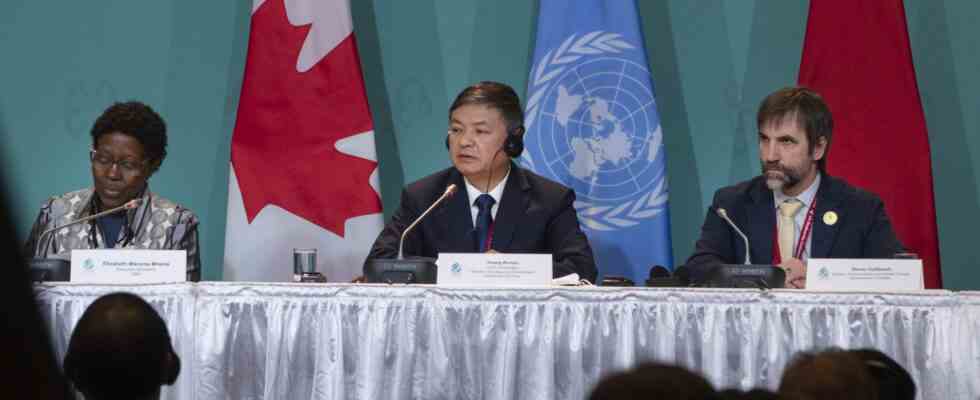Status: 12/18/2022 7:41 p.m
Shortly before the end of the World Conference on Nature, the Chinese Presidency presented a first draft of a final declaration. Although important main demands were included in it – for many it does not go far enough.
At the World Conference on Nature in Canada, a draft for a new species protection agreement was drawn up. The text, negotiated with China as mediator, stipulates that 30 percent of the earth’s land and sea surface will be declared protected areas. This was one of the key objectives of the UN Biodiversity Conference COP15, which is due to end on Monday.
To this end, rich countries should increase their financial support for developing countries for biodiversity to at least 20 billion dollars a year by 2025. According to the compromise proposal presented by the Chinese conference chair in Montréal, the sum should increase to 30 billion dollars by 2030.
Agreement has yet to be ratified
With the new partnership, “we can start implementing the new global agreement on biological diversity immediately after the decision has been taken,” said Federal Environment Minister Steffi Lemke in Montreal. All relevant actors should be involved and assume responsibility. In order to make the new species protection agreement possible, however, all 196 signatory states to the 1993 Convention on Biological Diversity still have to agree.
Funding for wildlife conservation in developing countries was a particularly contentious issue at the Montréal negotiations. Developing countries had requested financial support of at least $100 billion a year from richer countries. That would be ten times the current amount flowing from developed to developing countries to boost biodiversity – and the equivalent of the $100 billion pledged but not yet fully paid out to fight global warming.
Compromise breeds little enthusiasm
Initial reactions to the draft were mixed. Many of the goals are a “strong step in the right direction,” according to the nature conservation foundation WCS, for example. But the draft is not ambitious enough and many goals are planned too far into the future.
The environmental foundation WWF expressed disappointment. The desired partnership is “good and an important initiative to support countries in the Global South in implementing it immediately after the agreement is passed,” said Florian Titze, an expert on international politics at WWF Germany. However, the situation is dramatic. “Important key elements of the agreement remain unresolved.”
Postponed due to Corona
The World Nature Summit is due to end on Monday after around two weeks of negotiations. Almost 5000 delegates from all over the world take part in the meeting. The aim is a new species protection agreement of similar importance to the Paris climate protection agreement of 2015. According to scientists from the World Biodiversity Council IPBES, one million of the estimated eight million animal and plant species on earth are threatened with extinction.
The meeting will take place under the Chinese Presidency, but at the seat of the Secretariat of the Convention on Biological Diversity in Montréal. The 15th UN Meeting on Nature Conservation (COP15) was originally scheduled to take place in China in 2020, but was then postponed and split up due to the ongoing pandemic situation there. The first part of the negotiations took place mainly online in Kunming last October.
Still a lot of gaps: Status at the World Nature Summit in Montreal
Antje Passenheim, ARD New York, currently Montreal, December 18, 2022 12:36 a.m

